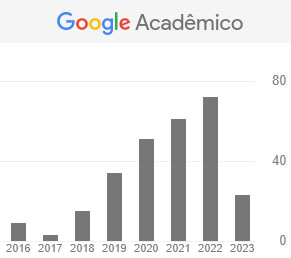Mathematics with the Flipped Classroom: an experience with edpuzzle
DOI:
https://doi.org/10.5965/2357724X12222024e0103Keywords:
metodologias ativas, ensino de matemática, vídeos, sala de aula invertida, edpuzzleAbstract
This article is presented as part of a research that focuses on the influence of active methodologies, namely the flipped classroom, on mathematics teaching and learning. Thus, this reports an experience with the use of video on the edpuzzle platform, in the aforementioned curricular component, with the objective of verifying the efficiency resulting from the use of active methodologies applied in the delivery of mathematical content. Regarding methodological aspects, descriptive and comparative longitudinal research was adopted, with a mixed approach, carried out in the form of action research, which made it possible to study a social situation with the objective of improving the quality of the action developed within it. As research participants, we had 35(thirty-five) students and 4 (four) mathematics teachers from Erem Fábio da Silveira Barros. In order to obtain answers to the questions addressed, we used the questionnaire for students, interviews for teachers, participant observation and document analysis as instruments for data collection. Thus, it was noticed that the results of this investigation showed significant contributions of this methodology to the teaching of mathematics. In this way, the research allowed students to take a different look at mathematical learning, providing interaction between content and reality and being the protagonist of meaningful learning.
Downloads
References
ALMEIDA, M. E. B. Apresentação. In: BACICH, L.; MORAN, J. (org.). Metodologias ativas para uma educação inovadora: uma abordagem teórico-prática. Porto Alegre: Penso, 2018. p.04.
BACICH, L. Formação continuada de professores para o uso de metodologias ativas. In: BACICH, L.; MORAN, J. (org.). Metodologias ativas para uma educação inovadora: uma abordagem teórico-prática. Porto Alegre: Penso, 2018. p. 129-152.
BERBEL, N. A. N. A. As metodologias ativas e a promoção da autonomia de estudantes. Semina: Ciências Sociais e Humanas, Londrina, v. 32, n. 1, p. 25-40, jan./jun. 2011.
BRASIL. Ministério da Educação. Base Nacional Comum Curricular. Brasília, DF: MEC, 2018.
FLN. FLIPPED LEARNING NETWORK. The Four Pillars of F-L-I-P™. [S. l.]: FLN, 2014. Disponível em: www.flippedlearning.org/definition. Acesso em: 25 jul. 2023.
FREIRE, P. Pedagogia da esperança: um reencontro com a pedagogia do oprimido. 15. ed. Rio de Janeiro: Paz & Terra, 2008.
MACEDO, L. de et al. Aprender com jogos e situações problema. Porto Alegre: Artes Médicas Sul, 2000.
MORAN, J. Mudando a educação com metodologias ativas. In: SOUZA, C.; MORALES, O. (orgs.). Convergências midiáticas, educação e cidadania: aproximações jovens. Ponta Grossa: UEPG/PROEX, 2015. v. 2. p. 15-33. (Coleção Mídias Contemporâneas).
TEOTONIA; MOURA. Metodologias ativas na aprendizagem: um desafio para o professor do século XXI. Formação Docente e Trabalho Pedagógico: Diálogos Fecundos. Org. Koachhann, A. Goiânia : Editora Scotti, 2020. p. 209.
Downloads
Published
How to Cite
Issue
Section
License
Copyright (c) 2024 Revista BOEM

This work is licensed under a Creative Commons Attribution-NonCommercial-NoDerivatives 4.0 International License.
Declaração de Direito Autoral
Os artigos publicados pela Revista BOEM são de uso gratuito, destinados a aplicações acadêmicas e não comerciais. As/os leitoras/es são livres para transferir, imprimir e utilizar os artigos publicados na Revista BOEM, desde que sempre haja menção explícita ao/s autor/es e à BOEM e que não haja qualquer alteração no trabalho original.
Todos os direitos autorais são atribuídos à revista BOEM. Ao submeter um artigo à Revista BOEM e tê-lo aprovado, as/os autoras/es concordam em ceder, sem remuneração, os direitos autorais à revista BOEM e a permissão para que a revista BOEM redistribua esse artigo e seus metadados aos serviços de indexação e referência que seus editores julguem apropriados.
Os artigos cujos autores são identificados representam a expressão do ponto de vista de seus autores e não a posição oficial da Revista BOEM.
O BOEM adota a licença Creative Commons - Atribuição-Não Comercial-Sem Derivações 4.0 Internacional.




